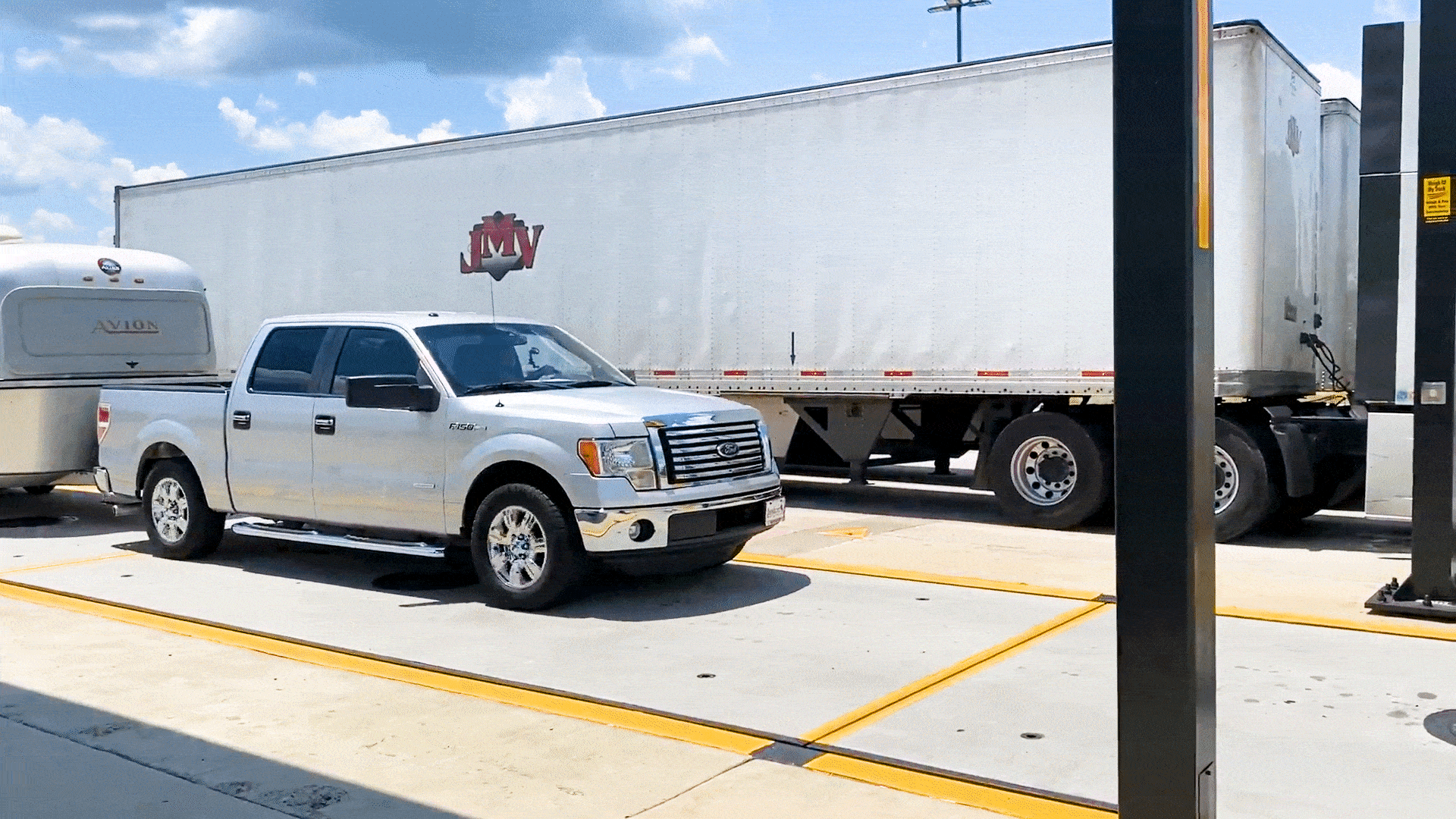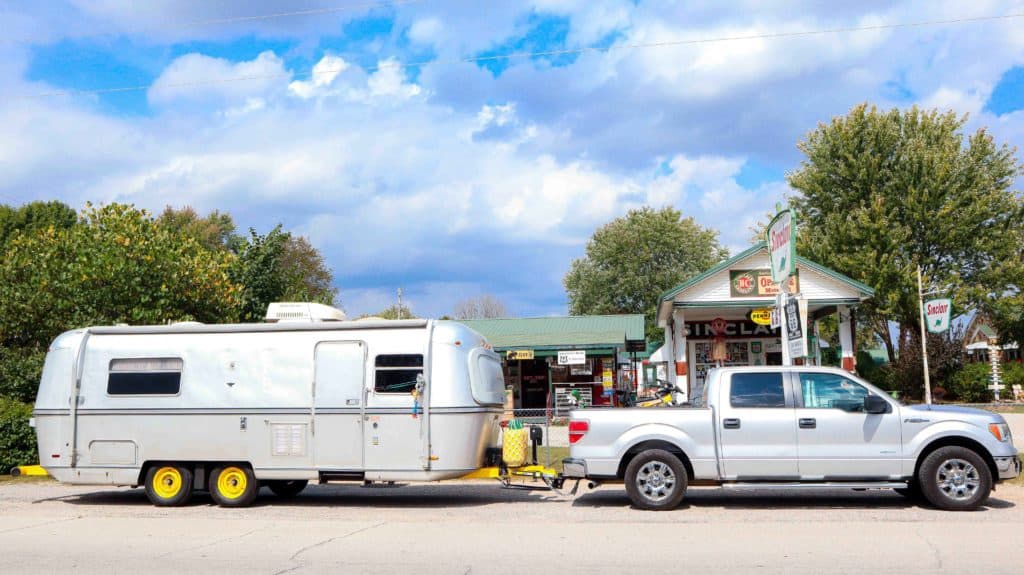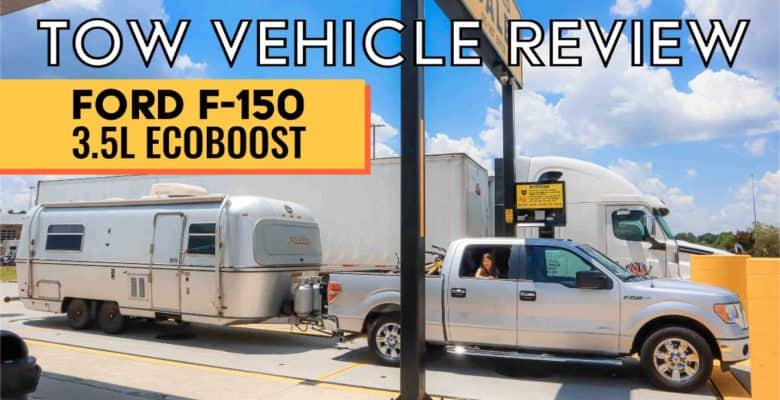This is ”our” personal experience with the Ford F150 3.5L EcoBoost truck.
📌 We CANNOT recommend. Ongoing issue with overheating. Truck can no longer tow, and cannot drive in hot weather.
EDIT: If you don't want to read the full explanation, you can google "Ford F150 Ecoboost overheating" and read the multiple threads. We honestly loved it, and it was truly wonderful until it wasn't. I am not trying to bash anyone's EcoBoost. We loved the truck. Please do your own research on this issue.
I want to share this experience because thought we had found a fantastic used tow vehicle, owned it for 1.5 years, and we had to replace it this week.
I did lots of research before landing on the F150 EcoBoost. We camp 7-9 times a year, but it’s my husband’s daily driver, and our trailer is on the lighter side; therefore, we didn’t want a 250 or 2500.
TRAILER INFO:
We have a 1973 LaGrande 25 (which is actually 26′). Dry, I believe the Tin Can Tourists site lists it as 4840lbs. (We have not yet weighed ours unloaded and cannot confirm. Ours is all original.)
We weighed it on our way out of town on CAT scales a year ago, and it was 5300lbs fully loaded. Before we bought the F-150, I had done the estimate on paper listing ALL items we typically packed and came in at 5265lbs, so I wasn’t off by much. We road trip often, but we travel relatively light.

PAYLOAD:
I also did the math on our payload before we bought the Ford EcoBoost truck. I added everything we carry in the cab and truck bed (going so far as to look up bike weights, car seat weights, etc.) and then padded that total with an additional 125lbs. Then I added 15% of our trailer weight and came up with a 1650lb payload requirement for our use. This number will vary for every single camper. Each family’s size, personal weights, what you pack, whether you have animals, how much your trailer weighs, etc.
Payload weight adds up fast on 150s and 1500 models. It can very easily and quickly be maxed out.
Here are the numbers for our 2012 supercrew 145″ WB 4×2 3.5L EcoBoost:
Rear axle ratio 3.55
GCWR 14,000
GVWR 6,800
Max loaded trailer weight 9,800 (our trailer loaded is 54% of max weight)
Max Payload 1,750 (we are 1650 including the extra padding)

You can find info for a truck by searching the VIN online to find rear axle ratio and tow package info under the equipment tab, and then look up the mfr brochure for your year and model for max payload and max loaded trailer weight (it will often be a downloadable PDF).
So this is our story.
In 2020, just before the hike in truck prices, I found a single-owner 2012 F-150 EcoBoost with a 3.55 rear axle ratio, factory tow, and just under 100K miles in Houston at a large dealership. We drove down from Dallas to get it.
It pulled our 26′ easily, felt super steady behind us, and we loved it. A lot.
(Before, we had a 2007 1500 Silverado towing our 1200lb Uhaul CT-13. After we got the 5Klb Avion, we quickly realized that it wouldn’t cut it. The Silverado was not a tow model.)
We did notice the F150 was going into the shop more often than our previous used Dodge (owned years ago) or Silverado, but we felt lucky to have a strong tow vehicle and loved the crew cab’s interior.

Fast forward to May 2022. It was hot in TX this year. 100+ degrees for most of the summer, I think. We had a trip to Fredricksburg and Llano River SP (TX hill country). We noticed on the drive down that for the first time EVER on any of our vehicles – we have always kept regular maintenance on all vehicles, the temperature gauge was rising…
We had to limp into Llano SP. The EcoBoost engine was nearly redlining on hills. We opened the windows – remember we had 100+ outdoor temps that felt like 110 😱, full blasted the heater – more 😱, pulled the speed waaaaaaaay down, and slowed traffic behind us. We called our mechanic in Dallas and called my brother, who has worked on cars as a hobby. We had a local mechanic change the thermostat, run tests, pressure checks, and fill fluids back to full. (I am not a mechanic and don’t recall all of the conversation with the local mechanic and all the tests he ran.)
Our Dallas mechanic thought we could limp back home if we left in the middle of the night with cooler outdoor temps and if we took it REALLY slow. It was in the low 70s when we left, and we only drove a few miles b/c the gauge was still spiking. We returned to the campsite and rented a Uhaul in the morning to tow the Avion.
Trevor drove the Uhaul towing the Avion, and I got the overheating F-150. Yay, me. The 300-mile trip took us over 9 hours.
I had all the windows down, heat on full blast, 30-45 mph MAX, multiple stops to let it cool down, and 2-30 minute meals.
It was as terrible as it sounds. I was melting the entire drive, downing water constantly, sweating buckets – literally, closely watching the temp gauge, monitoring the single file traffic behind me on our looooong stretches of 2 lane roads, and doing my best to find safe spots to slow/pull over to allow all to pass.
We took it to the shop next business day. Our mechanic ran all the tests and was stumped. He couldn’t replicate our temperature spike. He recommended replacing the radiator.
A couple days after getting it back, I drove less than 15 miles to pick up a desk chair. Obviously, NOT towing the trailer. And the temp starts to rise. 😖 What??!!! I limp home at 45 mph on the freeway with hazards on.
Note: We are right at 130k miles on the truck.
It goes back into the shop. While there, ANOTHER F150 EcoBoost comes in with the EXACT same issue. That owner also pulls a small travel trailer. Mechanic runs all the tests again, and office guy does all the online research. At this point, I start diving into research, too.
We discovered the EcoBoost overheating problem is VERY common. It’s all over the f150forum and f150ecoboostnet. Since 2011+, it’s been a common issue with no real fix. Ford has not acknowledged the problem. The F150 was in the shop for a month with no fix (on either of them).
We decided to move on. We needed a working tow vehicle.
Because I didn’t want to make another mistake, and I had read a knowledgeable comment by the admin of the Avion Owner fb group about the EcoBoost truck, I asked to chat with him about tow vehicles. He suggested a minimum 3.55 to 3.73 rear axle, 5.0+L, V8, with factory towing would work for our “smaller” trailer and primarily daily driver use. I still needed to check max payloads and trailer weight for each manufacturer, model, and year to confirm the truck would meet our needs.
This time, to be more thorough, I also googled “problems with “____insert maker and truck model here____” and eliminated years and models with heavy issues.
Holy smokes! It was hard to find a used 150 or 1500 truck with the needed rear axle ratio. Ford, Dodge, Chevy – most used 150 or 1500 trucks on the market have 3.15, 3.31, 3.21, or 3.23 rear axles depending on the maker. I guess most don’t need to tow. 😉 If we towed more miles each year or our trailer was a bit heavier, I would definitely go with a 250 or 2500.
Anyway, we finally found one, drove 4 hours yesterday, and got a 2011 Dodge 1500 crew cab, 5.7 Hemi V8 gas. Clear Carfax. 71K miles. 3.55 rear axle. Factory towing.
I mentioned our reason for replacing our truck to the sales guy. He tells me he used to run a tiny Ford dealership in OK. He now works solely in used cars, primarily trucks. He knows of the EcoBoost issue. Before knowing our mileage, he said he’s seen it often in the trucks above 130K miles. (So if you have one, just sell before then. Lol!)
I’ll get back to you in a year and a half and let you know how it goes with our “new” Dodge. 😆 Wish us luck!!


You mentioned it was fine at first and then developed this issue. I don’t see any mention about the fan. Was it’s operation checked? I would have tried by passing the temp switch and make it run high speed for the trip home, just to see if it helped the temperature. As a mechanic, I’ve also seen the blade come free off the motor shaft and not be spinning the speed it should.
Sorry for not mentioning the fan. It worked great. Both mechanics (in Junction, TX and Dallas) checked it. It was spinning especially strong during our breaks in an attempt to cool it down. But thank you for your suggestion. 🤗
And, as I first mentioned, this is our experience, and now that I’ve looked, I know there are so many same experiences with this truck. With this post, I only want to encourage anyone considering an F150 EcoBoost to do their own research.